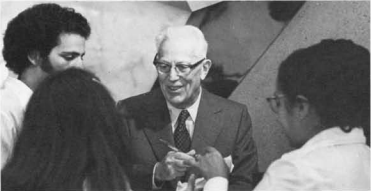Conversations with Earl Warren

The Law Forum invited retired Chief Justice Earl Warren to visit the School on April 30 to commemorate the twentieth anniversary of Brown v. Board of Education, the United States Supreme Court decision that ended public school segregation.
Chief Justice Warren first spoke informally with Dean Ehrlich and Professors Gerald Gunther, William Gould, and Barbara Babcock before a capacity audience in Annenberg Auditorium.
Professor Gunther, who was a law clerk to the Chief Justice from 1954 to 1955, described Brown as “an extraordinarily important event” and the prime stimulus of the civil rights movement.
Professor Gould said that Brown was the principal force in his decision to become a lawyer: “That decision gave me and other blacks the hope and belief that the law could address itself to racial injustices in this country and that I as a lawyer could make some contribution to end the old order against which my parents had struggled…. Brown was important to all black people because it gave us hope that we would have our day in court-both literally and figuratively.”
Professor Babcock, in assessing the effect of Brown on Criminal Procedure and Women and the Law, said that a criminal-justice revolution was caused by Brown and its focus on inequality.
Following the professors’ comments, the program shifted to a question-and-answer period with the Chief Justice. When asked whether he felt that criticism of the phrase “all deliberate speed” was justified, the Chief Justice asserted that if he had it to do over again, he would still use the phrase. He added that critics of the decree had not offered any sound alternative.
The Chief Justice was then asked to comment on the role of counsel in Brown. He observed that in the Supreme Court, as tin other I courts, “there are some good arguments, some bad; some very good, some very bad.” But he stressed that oral arguments are a vital part of the Judicial system because the true merit of the arguments are brought out through questions. He criticized the tendency to eliminate oral arguments as a “disservice to advocacy and the court.” He said that if there are not enough courts to allow for oral arguments, “then we should get enough.”
The Chief Justice said he found law clerks “very helpful and very important,” but he was not in favor of permanent clerks.
Responding to the query, “How did you feel when President Eisenhower appointed you to the Court?” the Chief Justice quipped, “I felt fine.”
The program was followed by a reception, where ChiefJustice Warren met informally with law students and faculty.
Editor’s Note: On July 9, 1974, Chief Justice Warren died at the age of 83.
